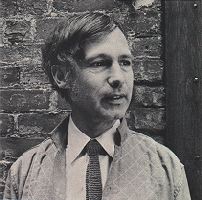A
little history behind
The Paris Workshop
 Wolfgang
Joachim Zuckermann invented the concept of the harpsichord "kit" in
the early 1960s. Produced in his New York workshop, it was a rather simple affair
without a bentside. Even though the keyboard more resembled that of a piano and
its soundboard was made from plywood, the "Slantside", as it was affectionately
known, became one of the most popular harpsichord models ever. The wooden pieces
for the case, along with some other commonly available parts, were not included,
so the price was set at a most economical $150. Little by little, the first Zuckermann
"kit" became more elaborate and complete.
Wolfgang
Joachim Zuckermann invented the concept of the harpsichord "kit" in
the early 1960s. Produced in his New York workshop, it was a rather simple affair
without a bentside. Even though the keyboard more resembled that of a piano and
its soundboard was made from plywood, the "Slantside", as it was affectionately
known, became one of the most popular harpsichord models ever. The wooden pieces
for the case, along with some other commonly available parts, were not included,
so the price was set at a most economical $150. Little by little, the first Zuckermann
"kit" became more elaborate and complete.
In 1969, Wolfgang
wrote The Modern Harpsichord, in which he described all the harpsichord
makers of his time, together with their philosophies and details of their production.
He soon became the close friend of his editor and publisher David Jacques Way
of October House, to whom he in fact sold Zuckermann Harpsichords Inc. in 1970.
David J. Way set about enthusiastically and rapidly modifying Wolfgang's original
kit, with the aim of making the design more traditionally based and aesthetically
pleasing. A workshop was established in the picturesque fishing village of Stonington
Connecticut (between Boston and New York) in 1972.
The decade
to 1980 saw the arrival of many models inspired by original instruments, commencing
with the Flemish Single. The French Double followed, then a Virginal, Italian
and Clavichord appeared. The Flemish keyboard range was enlarged and a second
keyboard added. The English Bentside Spinet and the Fortepiano were next. During
this time, original materials were also researched, and the Stonington workshop
was the first in the world to establish the general use of solid wood, soft wire
and historic-profiled tuning pins that we all take for granted on the finest
instruments today.
In 1973, Marc
Ducornet, who had initally learnt his craft of harpsichord making from an English
builder, became the French representative of David J. Way. Their relationship
developed so much so, that in 1982, he entered into partnership with David Way
to open the Montreuil (Paris) workshop for the manufacture of the Zuckermann
"kits" in France. The output of this workshop initially paralleled
the American production, and both shops continued to work closely and successfully
together over the years. Little by little, the atelier in Montreuil thrived and
before David Way died suddenly in February 1994, Marc Ducornet was supervizing
the conception and design of the instruments, as well as manufacturing fully
70% of the parts for USA and Europe.
To avoid the
possible closure of the American workshop at David Way's death, Marc Ducornet,
with the agreement of David's wife Katherine, decided to keep it running to perpetuate
David in our memories. Accordingly, Marc Ducornet installed Richard Auber—one
of his early American apprentices who knew David and already lived nearby the
Stonington shop—to head the operation. After five years of continued cooperation,
it became apparent on both sides of the North Atlantic that it was time for change.
For this to
be best accomplished it was agreed that it would probably be impracticable for
two workshops on separate continents to continue working so closely together.
In March 1999 therefore, Marc Ducornet decided to peacefully conclude his lengthy
association with the American workshop so he could concentrate on the creation
of numerous new instrument designs in France. To distinguish the differences
with the original United States-based models which evolved over more than two
decades, Marc Ducornet, together with his Agents, decided it was high time to
come even closer to the historic principles of construction and materials—wooden
jacks would be standard, for example—and to benefit from the excellent
manufacturing facilities available at Montreuil and twenty-five years of experience
to make the instruments even more professional.
Wolfgang
Zuckermann, who has been living in the south of France for many years, has
come out of harpsichord retirement to eagerly join his friend Marc Ducornet in
the "new" enterprise. The output of the newly-produced instruments
from France will be known very simply under the name THE PARIS
WORKSHOP, and will be available direct through a worldwide network of
knowledgeable and helpful Agents.
The Paris
Workshop: Marc Ducornet, Wolfgang Zuckermann, Emmanuel Danset & Associates
 Wolfgang
Joachim Zuckermann invented the concept of the harpsichord "kit" in
the early 1960s. Produced in his New York workshop, it was a rather simple affair
without a bentside. Even though the keyboard more resembled that of a piano and
its soundboard was made from plywood, the "Slantside", as it was affectionately
known, became one of the most popular harpsichord models ever. The wooden pieces
for the case, along with some other commonly available parts, were not included,
so the price was set at a most economical $150. Little by little, the first Zuckermann
"kit" became more elaborate and complete.
Wolfgang
Joachim Zuckermann invented the concept of the harpsichord "kit" in
the early 1960s. Produced in his New York workshop, it was a rather simple affair
without a bentside. Even though the keyboard more resembled that of a piano and
its soundboard was made from plywood, the "Slantside", as it was affectionately
known, became one of the most popular harpsichord models ever. The wooden pieces
for the case, along with some other commonly available parts, were not included,
so the price was set at a most economical $150. Little by little, the first Zuckermann
"kit" became more elaborate and complete.